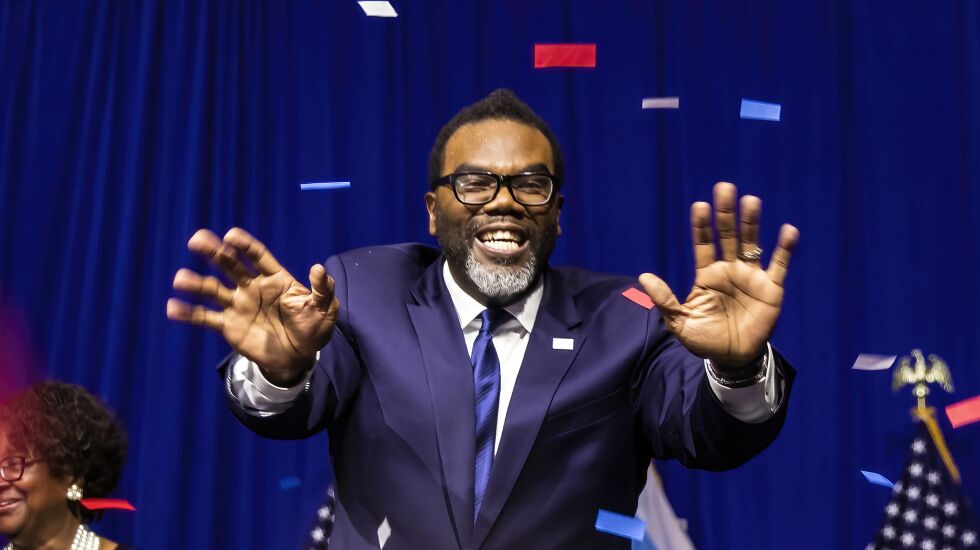
Well, look at that. Turns out Paul Vallas wasn’t a Republican after all. How can I tell? Easy. His swift, gracious concession Tuesday night after losing the race for Chicago mayor to Brandon Johnson.
“It’s critically important that we use this opportunity to come together,” Vallas said.
Recognition of electoral reality is not the standard GOP go-to move. It isn’t just Donald Trump and Kari Lake. Look at the key state Supreme Court race up in Wisconsin this week.
“I do not have a worthy opponent to which I can concede,” complained Dan Kelly, of the pro-choice woman who thumped him. “My opponent is a serial liar. She’s disregarded judicial ethics; she’s demeaned the judiciary with her behavior.”
Classy. The only reason Kelly couldn’t challenge the results was how badly he was drubbed — 10 percentage points, 55 to 45, a reminder that, given a say in the matter, most Americans don’t want Republicans peering down their pants, checking their business.
Returning to Vallas channeling the Beatles. “Come together.” But how?
First by recognizing just how perilous the city’s situation is right now. Take the usual urban woes — crime, schools, jobs, pensions — and mix in the unprecedented, seemingly endless post-pandemic hollowing out of downtown, and you have a recipe for a cake that looks very much like Detroit. That’s bad.
What should Johnson do? They say that to a hammer every problem looks like a nail, and, since I am a centrist, I’m going to plump for the middle way. It’s the only path to navigate a city that voted 51 percent for a fire-breathing union organizer who thinks a 3.5 percent flee-for-the-hills income tax is a good idea, and 48 percent for a corporate water carrier so in harmony with big money interests that gazillionaire Ken Griffin was blowing him kisses from Florida.
Start with the cops. FOP capo John Catanzara has been threatening that a thousand police officers will quit rather than work for a man who doesn’t roll at their feet like a puppy. Somebody should observe that maybe Chicago wants those particular officers to take a hike, in the hopes they’ll be replaced with new hires who maybe don’t think their choices are limited to a) do whatever we want without consequence or b) curl up in a fetal ball and whine about how everybody hates them and they can’t do their jobs. There must be a third choice. Other professions sure don’t act that way. “If you’re going to insist the cookies not be poison, then maybe I won’t bake anything at all!”
Here Johnson has some freedom. Because as the former Defund-the-Police guy, he will never win over the FOP crowd. He can shut off their body cameras and rename Chicago “Coptown” and it won’t help.
That’s liberating. Remember, the standard mayoral course is a slow, Stockholm syndrome slide into the arms of the police. This damages the mayors themselves — Rahm Emanuel is right now narrowing his eyes, surveying a raked karesansui gravel garden in Tokyo, sipping tea and plotting his return, because he handled the murder of Laquan McDonald like a cop, not like a mayor. And damaging to those Chicagoans who are not police officers.
Solving crime is key for two reasons. First, for the terrible direct impact of crime on the lives of Chicagoans. And second for the terrible image it creates for the city, hampering everything from tourism to investment. As bad as the rat-tat-tat shoot ’em up Al Capone image of the city was, at least it was sunk in the mock heroic past.
Nowadays, Chicago’s jaw-dropping present is slur aplenty, a self-fulfilling cycle that will get worse if people expect it to get worse.
If I could give one piece of advice to Johnson, I would direct his attention back to Harold Washington. People remember Washington adoringly, not for any particular achievement — he was pretty much thwarted by racists on the City Council — but because of his energy and enthusiasm. We need some of that now. As they say in meetings, “Fake it until you make it.” Johnson won’t solve Chicago’s problems because they can’t be solved. But he can sure try, and present Chicago to itself and the world as it actually is — a dynamic place bigger than the sum of its problems. A city with a future as well as a past. That sounds like a start.







